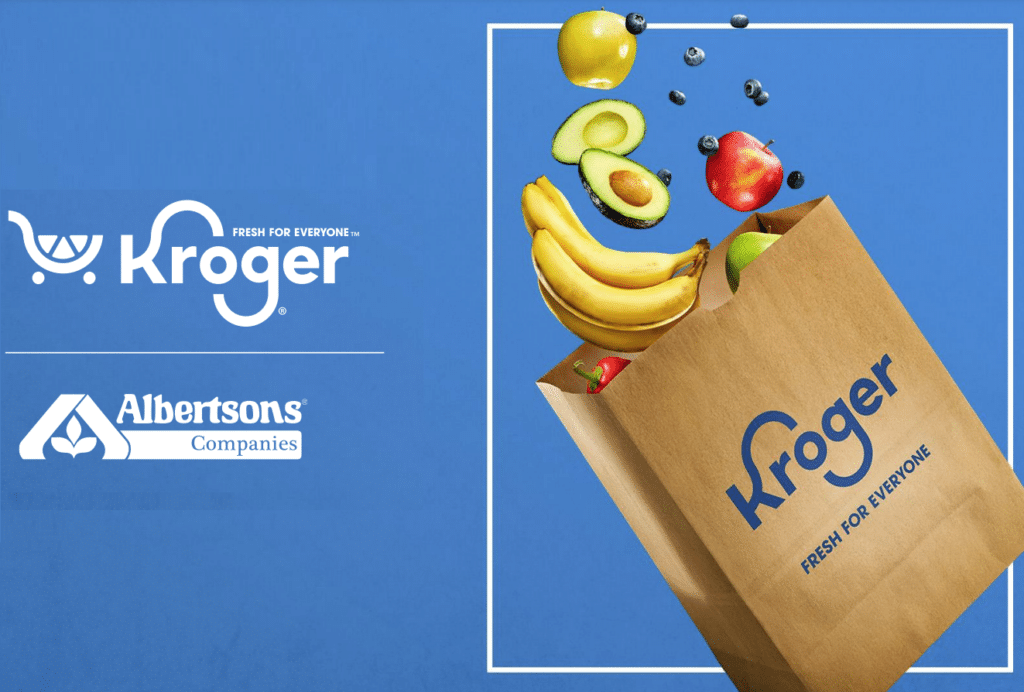
Could an Albertsons executive’s own words help to sink the retailer’s proposed merger with Kroger? Internal skepticism about the impact of the deal features prominently in a new lawsuit filed by Washington state’s Attorney General that seeks to block the grocery combination as being “bad for shoppers and workers.”
The lawsuit was announced Monday, hours after Kroger and Albertsons admitted they likely will not be able to close the deal imminently as they had hoped, instead anticipating it could be delayed until as late as August of this year – if it’s allowed to happen at all.
“Competition benefits consumers,” Washington Attorney General Bob Ferguson said in announcing the lawsuit. If Kroger and Albertsons are allowed to combine, he said, “shoppers will have fewer choices and less competition, and, without a competitive marketplace, they will pay higher prices at the grocery store. That’s not right, and this lawsuit seeks to stop this harmful merger.”
It was 15 months ago when Kroger announced its plans to purchase Albertsons for nearly $25 billion, a transaction the two retailers “expected to close in early 2024.” But unions, consumer representatives and others spoke out against the proposal, with one group of consumers filing a lawsuit alleging the deal would be harmful to employees and shoppers. States where the retailers do business have launched investigations, some of which may result in lawsuits of their own similar to Washington’s. And the Federal Trade Commission, which ultimately gets the decisive up-or-down vote on whether to allow the merger to move forward, has signaled skepticism and may yet file its own lawsuit to block the deal.
The Washington lawsuit lays out its case against the merger in great detail. But some of the most devastating criticism it contains, comes from Albertsons and Kroger themselves.
“It’s all about pricing and competition,” one Albertsons executive is quoted as saying in internal documents obtained by the Attorney General, “and we all know prices will not go down.” Another wrote, “you are basically creating a monopoly in grocery with the merger… [it] makes no sense.”
Ferguson argues that a combined Kroger-Albertsons would unacceptably reduce competition in his state, and the retailers’ promise that no stores will close as a result of the deal is disingenuous. The two grocers own more than half of all supermarkets in Washington, he points out, they account for more than half of all grocery sales, and they are each other’s primary competitors.
“The supermarkets monitor each other’s prices and adjust the cost of products as part of that competitive relationship,” the Attorney General’s office explained. “Albertsons’ Seattle Division, for example, has lowered its prices to compete with (Kroger-owned) Fred Meyer and QFC, and highlighted in its advertisements products where it offers a better deal. The merger eliminates that competition.”
The lawsuit goes on to say that “the vigorous head-to-head competition between Albertsons and Kroger banners is not limited to price. Albertsons and Kroger also improve and expand their product offerings and services to compete with, and win customers from, each other.” Allowing them to combine would, then, likely result in “increased product prices, decreased choices, and diminished supermarket shopping quality.”
The Attorney General also argues that the retailers’ plans to eliminate overlap by selling, rather than closing, hundreds of stores is “woefully inadequate.” The proposed buyer of those stores, C&S Wholesale Grocers, currently operates less than two dozen grocery stores, but plans to purchase more than 400 Kroger and Albertsons castoffs. “C&S is not a sufficiently established and sophisticated competitor,” the lawsuit reads, with “no track record of successfully running hundreds of grocery stores.” And as detailed in an earlier article on Coupons in the News, C&S also has a history of acquiring stores only to quickly sell them off to other operators or shut them down.
In a statement issued before the lawsuit became public, Kroger said it remains “in active and ongoing dialogue with the Federal Trade Commission and individual state Attorneys General regarding our proposed merger and divestiture plan. We believe our merger with Albertsons and the comprehensive divestiture to C&S will result in the best outcomes for customers, associates and our communities.” The retailer insists the deal “will mean lower prices and more choices for more customers.”
But with legal challenges beginning to pile up, it could ultimately be up to the courts to decide whether to allow the deal at all. Ferguson’s lawsuit asks for an injunction “permanently blocking the merger nationwide.” With shoppers complaining that grocery deals aren’t as good as they used to be, this is one grocery deal that’s going to remain in question for some time to come.
Image source: Kroger
















Even in Colorado that same kind of concentration applies. The two main grocery chains here are King Soopers (Kroger owned) and Safeway (Albertson’s owned and they are their chief competitors over most of the state.
It should of never been proposed for states west of Colorado. The concentration between Kroger and Albertsons is incredible as they are often the two main competitors (often over 50% in market sales). If Kroger wants to buy their stores in PA and to the north where they have no presence, go for it. Market Basket and others can use the competition. But not the West.